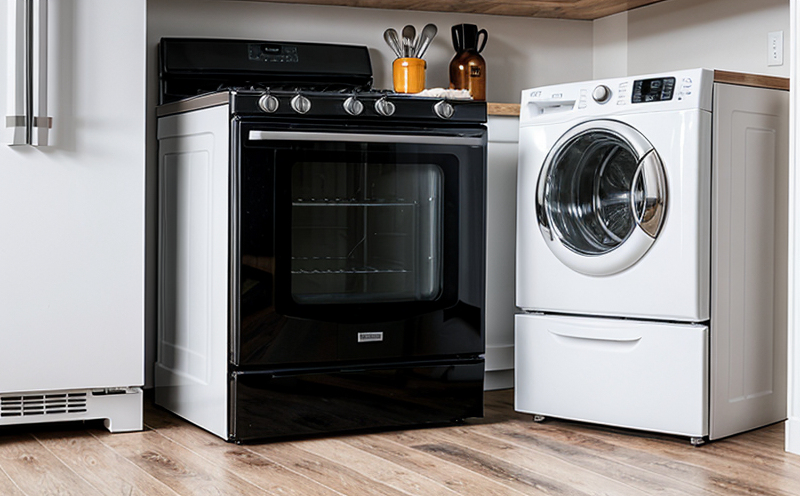UV Resistance Testing of Appliance Plastics
The durability and longevity of household appliances are crucial factors in consumer satisfaction. Over time, exposure to ultraviolet (UV) light can cause plastics used in appliance construction to degrade, leading to a loss of physical properties such as strength, flexibility, and color stability. This degradation can result in reduced product performance and increased risk of failure, ultimately affecting the overall quality and safety of the appliance.
Understanding and mitigating these effects is essential for manufacturers looking to ensure their products meet high standards of reliability and consumer expectations. UV resistance testing assesses how well a plastic material withstands exposure to ultraviolet radiation, helping to determine its suitability for long-term use in household appliances.
The testing process involves exposing a specimen cut from the plastic part of an appliance under controlled conditions to continuous or intermittent UV light. The specimen is then visually inspected and physically tested to evaluate changes such as color fading, loss of gloss, crack formation, and dimensional stability. Compliance with international standards like ISO 14523-1:2016 ensures that the testing methodology is standardized across industries.
By performing this test, manufacturers can identify potential weak points in their plastic components early on, allowing for necessary modifications before production begins. This proactive approach not only enhances product quality but also minimizes risks associated with premature failure and recalls. Furthermore, it supports regulatory compliance by meeting the stringent requirements of organizations such as Underwriters Laboratories (UL) and International Electrotechnical Commission (IEC).
For instance, in refrigerators or washing machines where durability is paramount, ensuring that the plastic components do not degrade under UV exposure can extend the appliance's service life. This is particularly important given the high usage rates of these appliances over several years.
- Visual Inspection: Checking for color changes and signs of degradation.
- Physical Testing: Evaluating tensile strength, impact resistance, and flexibility post-exposure.
- Dimensional Stability: Assessing any shrinkage or swelling that might affect the appliance's functionality.
The results from UV resistance testing are used to inform design decisions and material selection. By identifying which plastics perform best under UV exposure, manufacturers can optimize their product designs for better longevity and reliability. This not only enhances consumer trust but also contributes positively to brand reputation and market competitiveness.
In conclusion, UV resistance testing plays a vital role in ensuring the integrity of plastic components used in household appliances. It helps manufacturers meet quality standards, enhance durability, and maintain compliance with international regulations. Investing in this type of testing can lead to significant long-term benefits for both the manufacturer and the consumer.
Benefits
The implementation of UV resistance testing offers numerous advantages to manufacturers focusing on household appliance production:
- Enhanced Durability: Ensures that plastic components remain robust and functional over extended periods.
- Improved Quality Assurance: Provides detailed insights into material performance, aiding in quality control measures.
- Regulatory Compliance: Helps meet the stringent requirements set by regulatory bodies like UL and IEC.
- Informed Design Decisions: Enables manufacturers to select optimal materials based on test results for improved product longevity.
- Consumer Trust: Builds confidence among consumers regarding appliance reliability and safety.
- Competitive Advantage: Sets a benchmark for durability, enhancing brand reputation in the market.
By leveraging UV resistance testing, manufacturers can significantly improve their product offerings, ensuring they meet or exceed industry standards. This ultimately contributes to higher customer satisfaction levels and stronger brand loyalty.
Eurolab Advantages
At Eurolab, we pride ourselves on offering comprehensive and accurate testing services tailored specifically for the needs of our clients in the consumer products and product safety sector. Our expertise lies in providing precise and reliable data that can be used to inform critical decisions related to material selection and design optimization.
Our state-of-the-art facilities are equipped with advanced instrumentation capable of simulating real-world conditions, ensuring that every test conducted is both rigorous and relevant to actual usage scenarios. This allows us to provide insights that are truly reflective of how materials will perform in the field.
We employ a team of highly skilled professionals who possess extensive experience in conducting UV resistance tests according to international standards such as ISO 14523-1:2016. Their expertise ensures that each test is carried out consistently and accurately, providing results that are both consistent and actionable.
Our commitment to excellence extends beyond just the testing process itself; we also offer support throughout the entire project lifecycle—from initial consultation through final report delivery. This comprehensive approach guarantees that our clients receive not only accurate data but also meaningful interpretations that can be used effectively in their product development processes.
In summary, Eurolab’s commitment to providing high-quality UV resistance testing services is reflected in our state-of-the-art facilities, experienced personnel, and unwavering dedication to accuracy and precision. By choosing us as your partner for this critical service, you are investing in the long-term success of your products.
Why Choose This Test
- Promotes Durability: Ensures that plastics used in appliances remain strong and functional over time.
- Enhances Quality Assurance: Provides detailed data on material performance, crucial for maintaining high standards.
- Maintains Regulatory Compliance: Helps meet the stringent requirements set by recognized bodies such as UL and IEC.
- Informs Design Choices: Enables manufacturers to select optimal materials based on test results for improved product longevity.
- Bolsters Consumer Trust: Builds confidence among consumers regarding appliance reliability and safety.
- Achieves Competitive Edge: Sets a benchmark for durability, enhancing brand reputation in the market.
The UV resistance test is an essential tool for any manufacturer aiming to produce high-quality household appliances. By investing in this test, manufacturers can ensure that their products not only meet but exceed industry standards, leading to increased customer satisfaction and loyalty.





